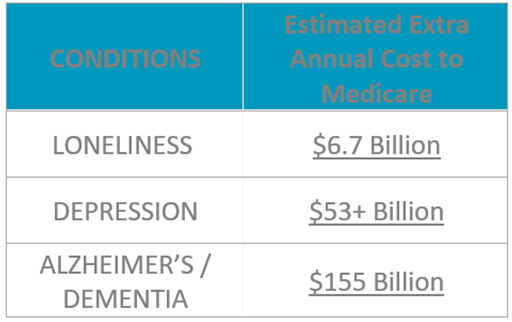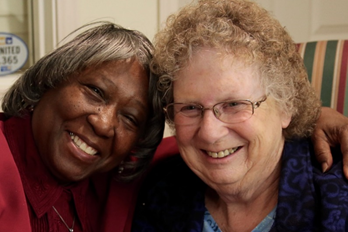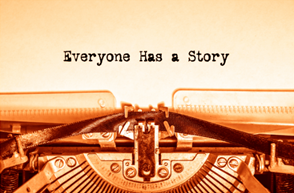
The Power of Storytelling for Health & Wellbeing
In this white paper, we will address some of the outcomes and reasons why reminiscence and life story work can be particularly powerful when working with older adults. To this end, let us first look at what challenges older adults are facing to set the stage.

Reaching Old Age
When was the last time you got younger? Since the Fountain of Youth has yet to be discovered, everyone continues to get older. Aging can be a funny thing. Children are so excited to get older that they often tell their age including half-year increments, “I’m four and a half!” Youth may feel invincible and not yet experience the pains associated with growing older. By the middle of our lives, we often wish time would slow down to keep us from getting over the hill so quickly. With regards to living one’s later years in life, Ralph Waldo Emerson claimed that, “The older you get, the older you want to get.”
Aging affects everyone. Whether it directly impacts you personally or someone you care for, many health concerns arise with age, both physical and emotional. Over time we find ourselves dealing with more health issues, which often leads to more medical and prescription intervention. This causes uncertainty, fear, and stress.
After coming to terms with needing more assistance, people may find themselves searching for home care or senior living options. As time marches on, some older people lose independence and realize limitations exist, and this can lead to feel discouraged. With separation from loved ones, some people begin to wonder why they are still here or what they should be doing now. Many respond to this stress by retreating and not taking care of themselves, which exacerbates health issues. The physical, emotional, and mental toll of aging has the potential to be a downward spiral, which needs to be prevented. Unfortunately, decline can worsen with life changes, such as retirement, illness, or less frequent contact with family and friends. Dr. Bill Thomas, the founder of the Eden Alternative, has well documented the plagues of old age are boredom, helplessness, and loneliness.
A Deeper Look into the Loneliness Pandemic
It is reported that 43% of people over the age of 60 are lonely. Many do not get visitors and have little to no family around. For those with limited technology access and ability, their personal connections may be further diminished. Some elders report that, despite living with and near other people, they still feel lonely.
Loneliness leads to negative effects and can be a major health risk. The University of California, San Francisco reports that loneliness can worsen cardiovascular health and increase risk for heart disease. It may lead to higher blood sugar levels, weight gain, and diabetes. Studies show that loneliness can cause higher rates of depression and poor sleep quality. In some people it increases systemic inflammation. Loneliness contributes to shorter lifespans and is also linked to higher rates of Alzheimer’s Disease and dementia. From a health plan point of view, it is important to note that approximately 43% of Medicare members age 65+ could be experiencing moderate or severe loneliness. Addressing loneliness could save between $3,100-$3,800 in prescription and medical costs per person per year. Loneliness and depression add cost to care and pain to older people’s lives. It is estimated that a person living with dementia could have additional lifetime costs of up to $100,000.

In addition to physical health risks, people experiencing loneliness may suffer greater emotional health risks. Lonely people have been found to face higher stress levels and struggles with self-care and relaxation. Loneliness often increases negative emotions, which can activate the fear and anxiety regions of the brain. Feeling alone can make it harder for a person to process life events, such as the death of a loved one, facing one’s own fears about sickness and death, or struggling with not maintaining the same abilities a person had when younger. Particularly with elders living with Alzheimer’s Disease and dementia, loneliness can worsen already limited cognitive abilities.
How can storytelling really help in health care and senior living?
Clearly, health problems result from loneliness. One of the most efficient ways to reduce loneliness is through storytelling—which has been found to increase happiness and satisfaction with life. Sharing life stories allows a person to talk more openly with their care partners (family, friends, volunteers, and care staff). Telling personal stories affirms the value of the whole person, beyond just their physical needs. Taking care of that emotional and spiritual component is imperative. Loneliness and isolation can shorten lives. Communicating stories can lead to greater feelings of wellbeing and lower stress hormones in the body. For people living with Alzheimer’s Disease and other forms of dementia, it may be harder to retain recent events in short-term memory. Long-term memories that can be more easily recalled are a source of comfort and peace when there is a chance to review them and share. When someone can be reminded of their life’s work or that they grew up in a certain hometown, it brings a sense of joy. “You know me. You remember me!”
Solutions are sought for…
The risk of suffering alone is now greater. This puts more urgency on the need for meaningful communication and creative ways to connect remotely that open the door for emotional wellness.

Storytelling allows some people to find healing and acceptance. For example, life review gives hospice patients the opportunity to find peace and closure as they come to the end of life. Veterans who have been able to share war stories can often better process and work through trauma. For others, sharing a story may lead them to forgive themselves for past mistakes or recognize how they have learned and grown. Once a person shares a story, he or she may wish to continue to share additional information in the future. In other words, it opens a door to new conversation and friendship. It can be empowering to allow someone to choose to share a difficult story. With time, storytelling can lead to better resiliency, allowing people to bounce back from struggles faster than if they had not shared their narrative.
Many experts believe that people who are emotionally well have fewer negative feelings and higher self-affirmation. Allowing a person to think and tell about what is important to them, can lead to feeling better and striving to maintain healthier behaviors and social involvement. Emotionally-well people hold on to positive emotions for longer and have the increased ability to express gratitude. They hold a deeper appreciation of good times, both past and present. Emotional wellness contributes to rebounding more quickly from difficult situations and some health problems.

Knowing a person’s background improves the quality of service and care a resident can receive. Storytelling improves efficiency and effectiveness in care staff at memory care communities. The stories shared by residents (and their families, particularly with memory care patients) can guide staff in how to best meet a resident’s needs. Information learned can encourage personalized daily care. Knowing a person’s stories helps individualize activities. For example, in senior living if a staff member learns that one of their elders was once a ballroom dancer, the community could host a ballroom dance, offer a dance class, or show movies with waltzing.
Can empowering people to tell life stories really make a difference?
From our experience, the answer is yes. LifeBio is an innovative web-based solution for storytelling, using reminiscence therapy techniques to capture life stories. Both loneliness and depression are being reduced by 15%, while happiness and satisfaction with life are increasing. Virtual training helps health care organizations use life stories to impact care. The LifeBio process results in an online and printed Life Story Book that the client, resident, or patient gets to keep. In addition, LifeBio creates a Snapshot (a story summary) and Action Plan that are used for staff education in health care. Materials are designed to enhance person-centered care.
It is powerful to know the whole person and to be able to individualize service and care. Daily life can be more engaging and fun when care partners feel closer, more efficient, and more effective in delivering care. A study with Youngstown State University reported just that. Staff felt more efficient and effective in caring for older adults when they had a LifeBio created for each resident of a memory care community.
Being a storyteller allows a person to have control of the stories that are shared. One can determine what is important to include and filter out smaller and less significant parts. When someone has lived 60, 70, 80, and even 90+ years, there is a lot of information to share, and it is fun! People love to teach and inform younger generations and “wow” them with stories of running behind a buggy as a child or describing the excitement of buying their first television set.

A person can detail turning points and things that shape them, while diving into deeper meaning and interpretations of events. The storyteller decides which significant characters and events to share. People love to share about the people who shaped their lives, historical events, childhood memories, school and work experiences, love and marriage memories, and get to the core of their values and beliefs. Do not underestimate the power of one’s life story. One gentleman at an assisted living community in Pennsylvania no longer wanted to get out of bed or eat, until a Penn State student began speaking with him to build his LifeBio. There was a remarkable change when he realized that he had the ability to NOT be bored, to be NOT be helpless – but helpful! Of course, this also reduced loneliness and changed the life of the young man who interviewed him as well. This is the power of the story! The story is sometimes a means to an end. Telling the story helps people come to terms with their past, teach and inform others, and share wisdom with the next generation. This living human library cannot be ignored.
While a person cannot control all the circumstances in life, there is now a remarkable chance to create an individual record of one’s life. Everyone has a story to tell, and most people want to tell it. Sadly, 9 out of 10 people die without it told. An obituary is too little, too late. Let us take this opportunity to capture life stories and create legacies without difficulty or delay. We are here to help make it happen!
For more information contact LifeBio, Inc.: www.lifebio.com info@lifebio.com 937-303-4576